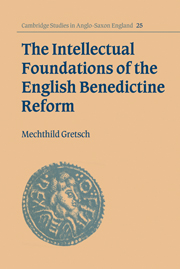Book contents
- Frontmatter
- Contents
- Preface
- List of abbreviations
- 1 Introduction
- 2 Psalters and psalter glosses in Anglo-Saxon England
- 3 The vocabulary of the Royal Psalter
- 4 The Royal Psalter and the Rule: lexical and stylistic links
- 5 The Aldhelm glosses
- 6 Word usage in the Royal Psalter, the Rule and the Aldhelm glosses
- 7 Æthelwold and the Old English Rule
- 8 Æthelwold and the Royal Psalter
- 9 Æthelwold and the Aldhelm glosses
- 10 French and German loan influence
- 11 Conclusion
- Appendix I Æthelwold's life and career
- Appendix II The Royal Psalter at Canterbury
- Appendix III The Gernrode fragments of an Old Saxon psalm commentary
- Bibliography
- Index of Old English words
- Index of Latin words
- General index
11 - Conclusion
Published online by Cambridge University Press: 01 October 2009
- Frontmatter
- Contents
- Preface
- List of abbreviations
- 1 Introduction
- 2 Psalters and psalter glosses in Anglo-Saxon England
- 3 The vocabulary of the Royal Psalter
- 4 The Royal Psalter and the Rule: lexical and stylistic links
- 5 The Aldhelm glosses
- 6 Word usage in the Royal Psalter, the Rule and the Aldhelm glosses
- 7 Æthelwold and the Old English Rule
- 8 Æthelwold and the Royal Psalter
- 9 Æthelwold and the Aldhelm glosses
- 10 French and German loan influence
- 11 Conclusion
- Appendix I Æthelwold's life and career
- Appendix II The Royal Psalter at Canterbury
- Appendix III The Gernrode fragments of an Old Saxon psalm commentary
- Bibliography
- Index of Old English words
- Index of Latin words
- General index
Summary
It has often been remarked that by the time of the Norman Conquest, English libraries were deficient in their holdings of patristic texts and texts in use in the contemporary continental curriculum, especially those employed in the quadrivium. Such remarks are usually made with the implied corollary that, in 1066, Anglo-Saxon learning and scholarship was not only in intellectual backwaters, but presented itself to the scholars arriving from the Continent in a state of outright stagnation.
However, verdicts such as these are given from the point of view of the Norman and French abbots and bishops, inspecting the holdings of their monastery and cathedral libraries and canvassing the scholarship of their Anglo-Saxon monks and clerics. These continental abbots and bishops will have known nothing about the early-tenth-century roots of the English veneration for Aldhelm; for them, Aldhelm will simply have been a massive fossil in the antiquated English curriculum, and they will have looked upon the hermeneutic style, so indebted to Aldhelm and so universally practised in late Anglo-Saxon England, as a strange peculiarity, to say the least. Similarly, for them, the works of Ælfric and of Archbishop Wulfstan or the huge vernacular gloss corpora preserved in Anglo-Saxon manuscripts can have held no interest.
It is true that in our times the writings of Aldhelm, Ælfric and Wulfstan, as well as other Old English prose works and Latin hermeneutic texts, have attracted their share of attention (and moderate admiration) from Anglo-Saxonists in general.
- Type
- Chapter
- Information
- The Intellectual Foundations of the English Benedictine Reform , pp. 425 - 427Publisher: Cambridge University PressPrint publication year: 1999

